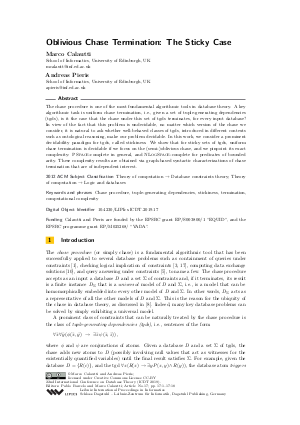Oblivious Chase Termination: The Sticky Case
Authors Marco Calautti, Andreas Pieris
-
Part of:
Volume:
22nd International Conference on Database Theory (ICDT 2019)
Part of: Series: Leibniz International Proceedings in Informatics (LIPIcs)
Part of: Conference: International Conference on Database Theory (ICDT) - License:
 Creative Commons Attribution 3.0 Unported license
Creative Commons Attribution 3.0 Unported license
- Publication Date: 2019-03-19
File

PDF
LIPIcs.ICDT.2019.17.pdf
- Filesize: 0.57 MB
- 18 pages
Document Identifiers
Subject Classification
ACM Subject Classification
- Theory of computation → Database constraints theory
- Theory of computation → Logic and databases
Keywords
- Chase procedure
- tuple-generating dependencies
- stickiness
- termination
- computational complexity
Metrics
- Access Statistics
-
Total Accesses (updated on a weekly basis)
0Document
0Metadata
Abstract
The chase procedure is one of the most fundamental algorithmic tools in database theory. A key algorithmic task is uniform chase termination, i.e., given a set of tuple-generating dependencies (tgds), is it the case that the chase under this set of tgds terminates, for every input database? In view of the fact that this problem is undecidable, no matter which version of the chase we consider, it is natural to ask whether well-behaved classes of tgds, introduced in different contexts such as ontological reasoning, make our problem decidable. In this work, we consider a prominent decidability paradigm for tgds, called stickiness. We show that for sticky sets of tgds, uniform chase termination is decidable if we focus on the (semi-)oblivious chase, and we pinpoint its exact complexity: PSpace-complete in general, and NLogSpace-complete for predicates of bounded arity. These complexity results are obtained via graph-based syntactic characterizations of chase termination that are of independent interest.
Cite As Get BibTex
Marco Calautti and Andreas Pieris. Oblivious Chase Termination: The Sticky Case. In 22nd International Conference on Database Theory (ICDT 2019). Leibniz International Proceedings in Informatics (LIPIcs), Volume 127, pp. 17:1-17:18, Schloss Dagstuhl – Leibniz-Zentrum für Informatik (2019)
https://doi.org/10.4230/LIPIcs.ICDT.2019.17
BibTex
@InProceedings{calautti_et_al:LIPIcs.ICDT.2019.17,
author = {Calautti, Marco and Pieris, Andreas},
title = {{Oblivious Chase Termination: The Sticky Case}},
booktitle = {22nd International Conference on Database Theory (ICDT 2019)},
pages = {17:1--17:18},
series = {Leibniz International Proceedings in Informatics (LIPIcs)},
ISBN = {978-3-95977-101-6},
ISSN = {1868-8969},
year = {2019},
volume = {127},
editor = {Barcelo, Pablo and Calautti, Marco},
publisher = {Schloss Dagstuhl -- Leibniz-Zentrum f{\"u}r Informatik},
address = {Dagstuhl, Germany},
URL = {https://drops.dagstuhl.de/entities/document/10.4230/LIPIcs.ICDT.2019.17},
URN = {urn:nbn:de:0030-drops-103197},
doi = {10.4230/LIPIcs.ICDT.2019.17},
annote = {Keywords: Chase procedure, tuple-generating dependencies, stickiness, termination, computational complexity}
}
Author Details
Funding
Calautti and Pieris are funded by the EPSRC grant EP/S003800/1 "EQUID", and the EPSRC programme grant EP/M025268/ "VADA".
References
-
Alfred V. Aho, Yehoshua Sagiv, and Jeffrey D. Ullman. Efficient Optimization of a Class of Relational Expressions. ACM Trans. Database Syst., 4(4):435-454, 1979.

-
Jean-François Baget, Michel Leclère, Marie-Laure Mugnier, and Eric Salvat. On rules with existential variables: Walking the decidability line. Artif. Intell., 175(9-10):1620-1654, 2011.

-
Catriel Beeri and Moshe Y. Vardi. A Proof Procedure for Data Dependencies. J. ACM, 31(4):718-741, 1984.

-
Marco Calautti, Georg Gottlob, and Andreas Pieris. Chase Termination for Guarded Existential Rules. In PODS, pages 91-103, 2015.

-
Andrea Calì, Georg Gottlob, and Michael Kifer. Taming the Infinite Chase: Query Answering under Expressive Relational Constraints. J. Artif. Intell. Res., 48:115-174, 2013.

-
Andrea Calì, Georg Gottlob, and Thomas Lukasiewicz. A general Datalog-based framework for tractable query answering over ontologies. J. Web Sem., 14:57-83, 2012.

-
Andrea Calì, Georg Gottlob, and Andreas Pieris. Towards more expressive ontology languages: The query answering problem. Artif. Intell., 193:87-128, 2012.

-
Alin Deutsch, Alan Nash, and Jeff B. Remmel. The Chase Revisisted. In PODS, pages 149-158, 2008.

-
Alin Deutsch and Val Tannen. Reformulation of XML Queries and Constraints. In ICDT, pages 225-241, 2003.

-
Ronald Fagin, Phokion G. Kolaitis, Renée J. Miller, and Lucian Popa. Data exchange: semantics and query answering. Theor. Comput. Sci., 336(1):89-124, 2005.

-
Tomasz Gogacz and Jerzy Marcinkowski. All-Instances Termination of Chase is Undecidable. In ICALP, pages 293-304, 2014.

-
Gösta Grahne and Adrian Onet. Anatomy of the Chase. Fundam. Inform., 157(3):221-270, 2018.

-
Bernardo Cuenca Grau, Ian Horrocks, Markus Krötzsch, Clemens Kupke, Despoina Magka, Boris Motik, and Zhe Wang. Acyclicity Notions for Existential Rules and Their Application to Query Answering in Ontologies. J. Artif. Intell. Res., 47:741-808, 2013.

-
Sergio Greco, Cristian Molinaro, and Francesca Spezzano. Incomplete Data and Data Dependencies in Relational Databases. Morgan & Claypool Publishers, 2012.

-
Sergio Greco, Francesca Spezzano, and Irina Trubitsyna. Stratification Criteria and Rewriting Techniques for Checking Chase Termination. PVLDB, 4(11):1158-1168, 2011.

-
André Hernich and Nicole Schweikardt. CWA-solutions for data exchange settings with target dependencies. In PODS, pages 113-122, 2007.

-
David Maier, Alberto O. Mendelzon, and Yehoshua Sagiv. Testing Implications of Data Dependencies. ACM Trans. Database Syst., 4(4):455-469, 1979.

-
Bruno Marnette. Generalized schema-mappings: from termination to tractability. In PODS, pages 13-22, 2009.

-
Michael Meier, Michael Schmidt, and Georg Lausen. On Chase Termination Beyond Stratification. PVLDB, 2(1):970-981, 2009.

